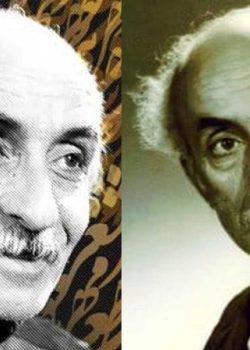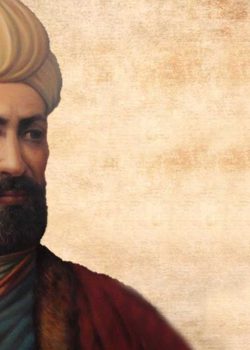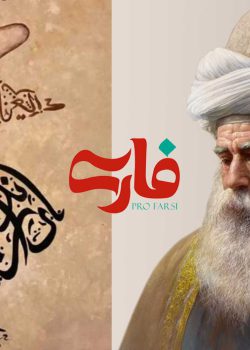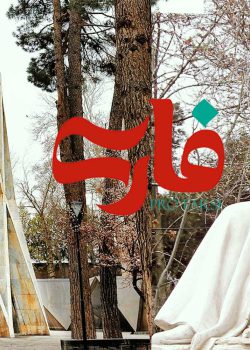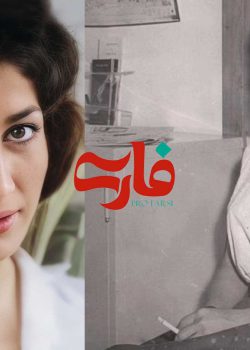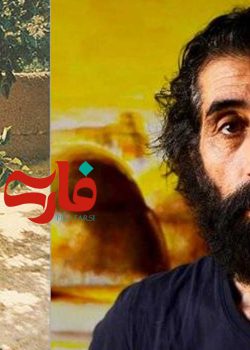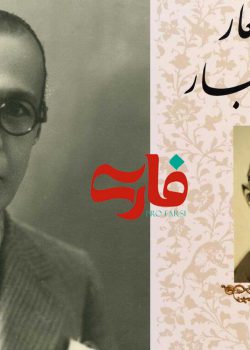Parvin Etesami Poems in Farsi and English
Parvin Etesami was a prominent Iranian poet and one of the first modern female poets in Iran. She was born on March 16, 1907, in Tabriz, Iran, and passed away on April 5, 1941, in Tehran. Parvin Etesami came from a family with a strong literary background, as her father, Yousef Etesami, was a well-known poet and scholar.
Parvin Etesami’s poetry is characterized by its elegance, simplicity, and profound themes. Her works often explore topics such as love, nature, patriotism, and social justice. She was deeply influenced by classical Persian poetry and used traditional poetic forms in her works, which earned her the nickname “The Bridge between Classical and Modern Poetry” in Iran.

Etesami’s poetry gained recognition during her lifetime, and she received praise from prominent literary figures and intellectuals of her time. Her poems were published in leading literary magazines, and her first collection of poetry, titled “Divan-e Parvin Etesami,” was published in 1935.
Throughout her life, Parvin Etesami faced personal challenges and health issues, but she remained dedicated to her literary pursuits. Despite her relatively short life, she left a lasting impact on Persian literature and is celebrated as one of the most significant female poets in Iran’s literary history.
Parvin Etesami’s poetry continues to be cherished and studied in Iran and beyond, and her legacy as a talented and influential poet endures to this day. Her works are admired for their lyrical beauty, emotional depth, and meaningful messages that resonate with readers of different generations.
Parvin Etesami’s poems are renowned for their elegance, emotional depth, and timeless themes. Here are a few excerpts from her poems:
“صاف و درد”
غنچه ای گفت به پژمرده گلی”
که ز ایام، دلت زود آزرد
آب، افزون و بزرگست فضا
ز چه رو، کاستی و گشتی خرد
زینهمه سبزه و گل، جز تو کسی
نه فتاد و نه شکست و نه فسرد
گفت، زنگی که در آئینهٔ ماست
نه چنانست که دانند سترد
دی، می هستی ما صافی بود
صاف خوردیم و رسیدیم به درد
خیره نگرفت جهان، رونق من
بگرفتش ز من و بر تو سپرد
تا کند جای برای تو فراخ
باغبان فلکم سخت فشرد
چه توان گفت به یغماگر دهر
چه توان کرد، چو میباید مرد
تو بباغ آمدی و ما رفتیم
آنکه آورد ترا، ما را برد
اندرین دفتر پیروزه، سپهر
آنچه را ما نشمردیم، شمرد
غنچه، تا آب و هوا دید شکفت
چه خبر داشت که خواهد پژمرد
ساقی میکدهٔ دهر، قضاست
همه کس، باده ازین ساغر خورد”
“Smooth and painful,”
A blossom spoke to a withering flower:
‘From the passing days, your heart is quickly wounded.
Space is vast and the water abundant,
Why did you diminish and become small?
Amidst all this greenery and flowers, no one,
Neither fell, nor broke, nor became cold.
The bell that is in our mirror,
Is not as severe as they suppose.
Yesterday, I was the wine of purity,
We drank pure and reached the pain.
The world didn’t take notice of my brilliance,
It took it from me and entrusted it to you.
So, make room for yourself widely,
The gardener of the heavens pressed hard on me.
What can be said to the greedy hands of fate?
What can be done when one must die?
You came to the garden and we left,
Whoever brought you took us away.
In this book of victory, the heavens,
It counted what we didn’t count.
The blossom, until it saw the water and air,
Didn’t know it would wither.
The cupbearer of the tavern of destiny is fate,
Everyone drinks wine from this goblet”
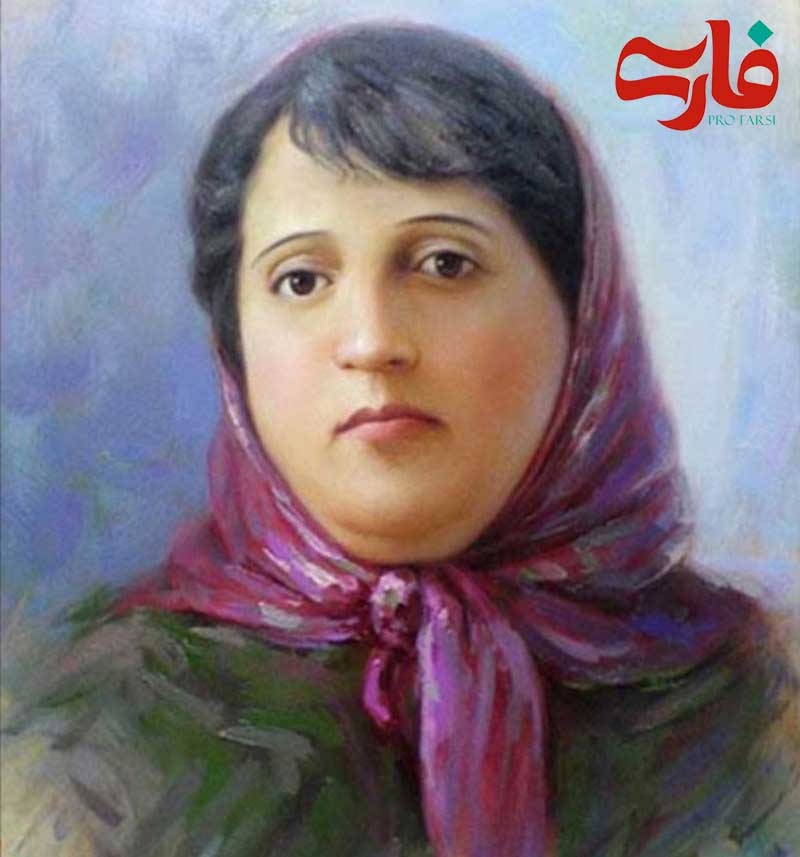
به لاله نرگس مخمور گفت وقت سحر
که هر که در صف باغ است صاحب هنریست
بنفشه مژدهٔ نوروز میدهد ما را
شکوفه را ز خزان وز مهرگان خبریست
بجز رخ تو که زیب و فرش ز خون دل است
بهر رخی که درین منظر است زیب و فریست
جواب داد که من نیز صاحب هنرم
درین صحیفه ز من نیز نقشی و اثریست
میان آتشم و هیچگه نمیسوزم
هماره بر سرم از جور آسمان شرریست
علامت خطر است این قبای خون آلود
هر آنکه در ره هستی است در ره خطریست
بریخت خون من و نوبت تو نیز رسد
بدست رهزن گیتی هماره نیشتریست
خوش است اگر گل امروز خوش بود فردا
ولی میان ز شب تا سحر گهان اگریست
از آن، زمانه بما ایستادگی آموخت
که تا ز پای نیفتیم، تا که پا و سریست
یکی نظر به گل افکند و دیگری بگیاه
ز خوب و زشت چه منظور؟ هر که را نظریست
نه هر نسیم که اینجاست بر تو میگذرد
صبا صباست، به هر سبزه و گلش گذریست
میان لاله و نرگس چه فرق، هر دو خوشند
که گل بطرف چمن هر چه هست عشوهگریست
تو غرق سیم و زر و من ز خون دل رنگین
بفقر خلق چه خندی، تو را که سیم و زریست
ز آب چشمه و باران نمیشود خاموش
که آتشی که در اینجاست آتش جگریست
هنر نمای نبودم بدین هنرمندی
سخن حدیث دگر، کار قصه دگریست
گل از بساط چمن تنگدل نخواهد رفت
بدان دلیل که مهمان شامی و سحریست
تو روی سخت قضا و قدر ندیدستی
هنوز آنچه تو را مینماید آستریست
از آن، دراز نکردم سخن درین معنی
که کار زندگی لاله کار مختصریست
خوش آنکه نام نکوئی بیادگار گذاشت
که عمر بی ثمر نیک، عمر بی ثمریست
کسیکه در طلب نام نیک رنج کشید
اگر چه نام و نشانیش نیست، ناموریست
“At dawn, to the intoxicated tulip and narcissus, he said,
‘Anyone in the garden is a master of art.’
The violet heralds the Nowruz for us,
The bud has news of autumn and the month of Mehr.
Except for your face, which is beautiful and fresh with heart’s blood,
For the face that’s in this scene, beauty and grace is nothing.
He replied, ‘I, too, am a master of art,
In this album, there is a picture and a trace from me.’
Amidst fire, I do not burn in vain,
On my head, from the cruelty of the heavens, a spark is constant.
This robe, stained with blood, is a sign of danger,
Anyone who is on the path, is in danger.
My blood was shed, and your turn will come as well,
By the hands of the thief of time, there is always more poison.
It is good if the flower is beautiful today, but tomorrow,
But amidst the night until dawn, if there’s a thorn, it’s painful.
From that, the world has taught us steadfastness,
Until we don’t fall on our feet, till there’s head and foot.
One throws a glance at the flower, and another at the plant,
About beautiful and ugly, what is the intention? Whoever has a glance.
Not every breeze that is passing by you here,
It’s the breeze, it’s the morning breeze, that passes over every greenery and flower.
Amidst tulip and narcissus, what’s the difference? Both are beautiful,
For the flowers towards the meadow, whatever it is, it’s a coquetry.
You are immersed in silver and gold, and I am red with heart’s blood,
What do you laugh at poverty of people, when you have silver and gold?
From the spring and rain, one cannot be silent,
For the fire that’s here is the fire of the liver.
I wasn’t a showman in this artistry,
Different talk, different story is my work.
The flower will not go from the table of the meadow’s party,
For the reason that it is a guest of the evening and morning.
You have not yet seen the harshness of fate and destiny,
What you see for yourself is still a cover.
Because of that, I didn’t extend the talk on this matter,
For the work of life is a short affair of the tulip.
Happy is the one who left a good name as a legacy,
For a good name, even if it lacks fame, is a lasting name.
The one who endured hardship in pursuit of a good name,
Although his name and fame are not there, he is famous.”
کبوتر بچهای با شوق پرواز
بجرئت کرد روزی بال و پر باز
پرید از شاخکی بر شاخساری
گذشت از بامکی بر جو کناری
نمودش بسکه دور آن راه نزدیک
شدش گیتی به پیش چشم تاریک
ز وحشت سست شد بر جای ناگاه
ز رنج خستگی درماند در راه
گه از اندیشه بر هر سو نظر کرد
گه از تشویش سر در زیر پر کرد
نه فکرش با قضا دمساز گشتن
نهاش نیروی زان ره بازگشت
نه گفتی کان حوادث را چه نامست
نه راه لانه دانستی کدامست
نه چون هر شب حدیث آب و دانی
نه از خواب خوشی نام و نشانی
فتاد از پای و کرد از عجز فریاد
ز شاخی مادرش آواز در داد
کزینسان است رسم خودپسندی
چنین افتند مستان از بلندی
بدین خردی نیاید از تو کاری
به پشت عقل باید بردباری
ترا پرواز بس زودست و دشوار
ز نو کاران که خواهد کار بسیار
بیاموزندت این جرئت مه و سال
همت نیرو فزاید، هم پر و بال
هنوزت دل ضعیف و جثه خرد است
هنوز از چرخ، بیم دستبرد است
هنوزت نیست پای برزن و بام
هنوزت نوبت خواب است و آرام
هنوزت انده بند و قفس نیست
بجز بازیچه، طفلان را هوس نیست
نگردد پخته کس با فکر خامی
نپوید راه هستی را به گامی
ترا توش هنر میباید اندوخت
حدیث زندگی میباید آموخت
بباید هر دو پا محکم نهادن
از آن پس، فکر بر پای ایستادن
پریدن بی پر تدبیر، مستی است
جهان را گه بلندی، گاه پستی است
به پستی در، دچار گیر و داریم
ببالا، چنگ شاهین را شکاریم
من اینجا چون نگهبانم، تو چون گنج
ترا آسودگی باید، مرا رنج
تو هم روزی روی زین خانه بیرون
ببینی سحربازیهای گردون
از این آرامگه وقتی کنی یاد
که آبش برده خاک و باد بنیاد
نهای تا زاشیان امن دلتنگ
نه از چوبت گزند آید، نه از سنگ
مرا در دامها بسیار بستند
ز بالم کودکان پرها شکستند
گه از دیوار سنگ آمد گه از در
گهم سرپنجه خونین شد گهی سر
نگشت آسایشم یک لحظه دمساز
گهی از گربه ترسیدم، گه از باز
هجوم فتنههای آسمانی
مرا آموخت علم زندگانی
نگردد شاخک بی بن برومند
ز تو سعی و عمل باید، ز من پند
“A young dove with eagerness to fly,
Boldly opened its wings one day.
It flew from a branch to another,
Passed over a rooftop to reach the riverbank.
Appeared to it to be a long distance,
It became weak from fear all of a sudden.
Weary from suffering on the journey,
It sometimes looked around anxiously,
Sometimes, troubled, hid its head under the wing,
Neither thought about getting along with fate,
Nor had the strength to return from that path,
Neither knew the names of the occurrences,
Nor knew the way to its nest.
It didn’t know how the waters flow,
Nor did it know the dream and the sign of happiness.
It fell and cried out from the pain,
It called out from its mother’s branch.
Such is the tradition of self-conceit,
Thus, drunkards fall from high places.
For such insight, you are not capable,
You must have endurance on the back of your mind.
Your flight is still quick and difficult,
With new tasks, there is much work.
It must teach you both courage and strength,
Both wings and feathers.
Your heart is still weak, your stature small,
You still have fear of a sudden attack from fate.
You still have no footing or roof,
You still have sleep and rest ahead.
You still have no shackles or cage,
Except for playing, children have no desire.
No one will mature with a raw thought,
No one has paved the path of existence in one step.
You must weave your own art in this bush,
You must learn the story of life.
You must place both feet firmly,
And then, think of standing on your feet.
Flying without the wings of wisdom is drunkenness,
The world goes from heights to lows.
Inside the low, we have to fight and endure,
We hunt the falcon at high places.
While I am the watchman here, you are the treasure,
You need tranquility, I have suffering.
You need a swift flight, which is difficult,
From new tasks, you need both wings and feathers.
You are still weak in heart and small in stature,
You still have fear of an unexpected attack.
You are still not accustomed to the low and high,
You are still in need of sleep and rest.
You are still not bound by ropes and cages,
Except for playing, children have no desire.
You won’t achieve anything with a raw thought,
You won’t find the path of existence with one step.
You must learn both art and wisdom,
The story of life must be learned.
When you pass from here to the world,
You will see the wonders of the universe.
From this tranquil abode, when you recall,
That its water has taken the soil, and the wind the foundation.
You are not a safe-hearted ascetic,
Nor will your wooden stick help you, nor will a stone.
Many times, they trapped me in traps,
They broke the feathers from my wings.
Sometimes, from the stone wall, sometimes from the door,
Sometimes, my head was covered with wounds, sometimes, my neck.
I didn’t have a moment’s peace or comfort,
Sometimes I was afraid of a cat, sometimes of a falcon.
The onslaught of celestial calamities,
Taught me the science of life.
The little branch will not rise without a foundation,
You need effort and action, I need advice
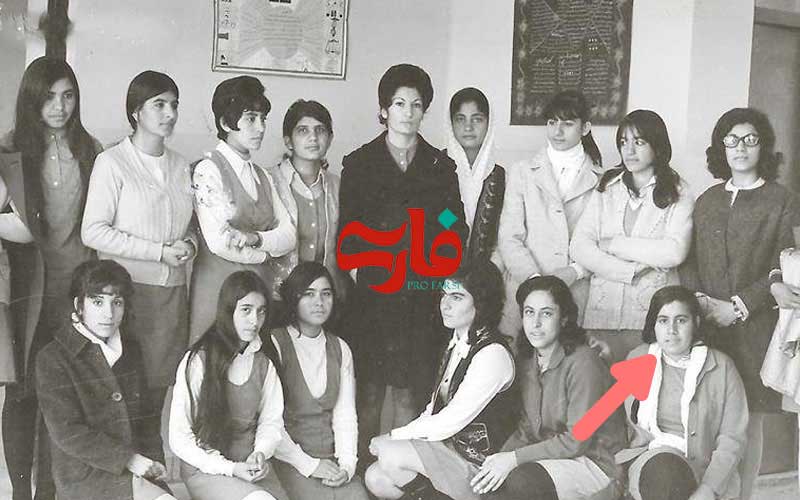
روز بگذشته خیالست که از نو آید
فرصت رفته محالست که از سر گردد
کشتزار دل تو کوش که تا سبز شود
پیش از آن کاین رخ گلنار معصفر گردد
زندگی جز نفسی نیست، غنیمت شمرش
نیست امید که همواره نفس بر گردد
“Yesterday is a mere illusion that returns anew,
The opportunity that has passed is impossible to come back.
Cultivate the field of your heart, so it becomes green,
Before this pomegranate-colored face turns saffron.
Life is nothing but a breath; count it as a blessing,
There is no hope that each breath will return.”
در دست بانوئی به نخی گفت سوزنی
کای هرزه گرد بی سر و بی پا چه میکنی
ما میرویم تا که بدوزیم پاره ای
هر جا که می رسیم تو با ما چه میکنی
خندید نخ که ما همه جا با تو همرهیم
بنگر به روز تجربه تنها چی میکنی
“In the hands of a lady, a thread said to a needle,
‘Oh, you aimless wanderer without head and without feet, what are you doing?’
‘We are going to sew a piece,’ said the needle,
‘Wherever we arrive, what are you doing with us?’
The thread laughed, ‘We are companions everywhere with you,
Look at the day of experience; what are you doing alone?'”
با قضا، چیره زبان نتوان بود
که بدوزند، گرت صد دهن است
دل پاکیزه، بکردار بد آلوده مکن
تیرگی خواستن، از نور گریزان شدن است
“With destiny, you cannot argue with a clever tongue,
For a hundred mouths are there to stitch you up if you do.
Keep your pure heart clean and do not commit sinful deeds,
Seeking darkness is running away from the light.”
بی رنج، زین پیاله کسی می نمیخورد
بی دود، زین تنور بکس نان نمیدهند
تیمار کار خویش تو خودخور، که دیگران
هرگز برای جرم تو، تاوان نمیدهند
“No one drinks from this cup without suffering,
No one gets bread from this oven without smoke.
Mind your own business, for others
Will never pay the price for your wrongdoing.”
سیر، یک روز طعنه زد به پیاز
که تو مسکین چقدر بد بوئی
گفت، از عیب خویش بیخبری
زان ره از خلق، عیب میجوئی
گفتن از زشتروئی دگران
نشود باعث نکوروئی
تو گمان میکنی که شاخ گلی
بصف سرو و لاله میروئی
یا که همبوی مشک تاتاری
یا ز ازهار باغ مینوئی
خویشتن، بی سبب بزرگ مکن
تو هم از ساکنان این کوئی
ره ما، گر کج است و ناهموار
تو خود، این ره چگونه میپوئی
در خود، آن به که نیکتر نگری
اول، آن به که عیب خود گوئی
ما زبونیم و شوخ جامه و پست
تو چرا شوخ تن نمیشوئی
“One day, Garlic taunted the Onion,
‘You have such a foul odor, poor you!’
Onion replied, ‘Unaware of your own flaws,
You find faults in others, it’s nothing new!’
Talking about others’ ugliness and faults,
Won’t make you any less repulsive, too.
You think you are like the branch of a rose,
While in the line of cypress and tulip, you grew.
Or that you’re a musk-wearing Tartar knight,
Or a flower from the garden, you construe.
Don’t make yourself great without any cause,
You’re part of this land’s inhabitants too.
Though our path may be crooked and rough,
Why don’t you become like this path, askew?
Look within to find what’s better in you,
First, disclose your own faults before you accuse.
We are jesters in rags, low and humble,
Why don’t you become a humble soul too?”
نه کسی میکند مرا یاری
نه رهی دارم از برای فرار
نه توان بود بردبار و صبور
نه فکندن توان ز پشت، این بار
خواری کس نخواستم هرگز
از چه رو، کرد آسمانم خوار
“Neither does anyone offer me help,
Nor do I have a way to escape or flee,
I can neither be patient nor endure,
Nor can I bear the burden of this affair.
I have never sought humiliation from anyone,
So why has the sky humbled me so?”
ای دل، اول قدم نیکدلان
با بد و نیک جهان، ساختن است
صفت پیشروان ره عقل
آز را پشت سر انداختن است
ای که با چرخ همی بازی نرد
بردن اینجا، همه را باختن است
دل ویرانه عمارت کردن
خوشتر از کاخ برافراختن است
“O heart, taking the first step toward the virtuous ones
Is to build (construct) the world of good and evil.
The quality of the pioneers of the path of reason
Is to leave behind desire and pleasure.
You who are playing dice with the wheel of fortune,
To win here is to lose everything.
To make the heart desolate and ruined,
Is more beautiful than building a palace.”
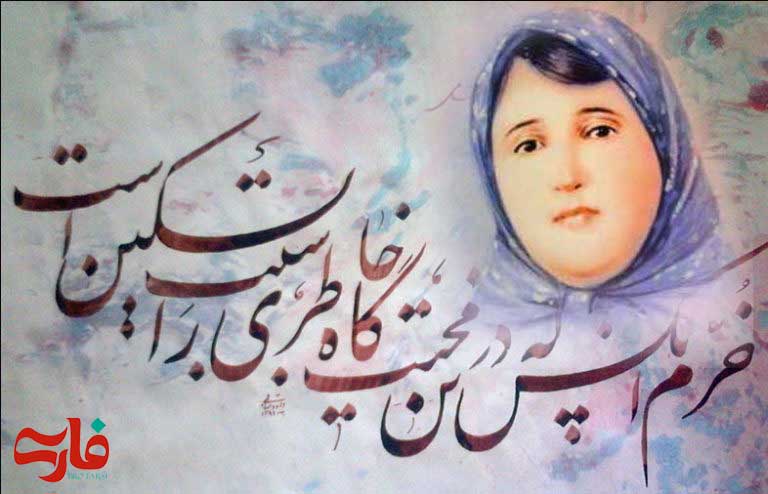
این که خاک سیهش بالین است
اختر چرخ ادب پروین است
گر چه جز تلخی از ایام ندید
هر چه خواهی سخنش شیرین است
صاحب آن همه گفتار امروز
سائل فاتحه و یاسین است
آدمی هر چه توانگر باشد
چون بدین نقطه رسد مسکین است
“The black soil is his bed,
The Pleiades (stars) are the wheel of the orbit of his culture.
Although he has seen nothing but bitterness in his days,
Whatever he says is sweet.
The owner of all the speech today
Is the seeker (reader) of Surah Al-Fatiha and Surah Yasin.
A man, no matter how affluent he may be,
When he reaches this point, he is poor.”
جوانی چنین گفت روزی به پیری
که چون است با پیریت زندگی
بگفت اندرین نامه حرفی است مبهم
که معنیش جز وقت پیری ندانی
تو، به کز توانائی خویش گوئی
چه میپرسی از دورهٔ ناتوانی
جوانی نکودار، کاین مرغ زیبا
نماند در این خانهٔ استخوانی
متاعی که من رایگان دادم از کف
تو گر میتوانی، مده رایگانی
هر آن سرگرانی که من کردم اول
جهان کرد از آن بیشتر، سرگرانی
چو سرمایهام سوخت، از کار ماندم
که بازی است، بیمایه بازارگانی
از آن برد گنج مرا، دزد گیتی
که در خواب بودم گه پاسبانی
“A young man once said to an elder,
‘How is life with old age?’ he replied,
‘This letter contains an enigmatic word
That you won’t understand until old age.’
You boast about your abilities,
Why do you ask about a time of weakness?
Youth is like a blessed bird
That no longer remains in this bony cage.
The treasure that I gave away freely from my hand,
Do not expect to receive it for free.
The enjoyment I had at first
The world had even more enjoyment.
When my capital was depleted, I was left with nothing,
For this is just a game, a merchant’s trade.
It was the cunning thief of destiny
Who stole my treasure while I was asleep.”
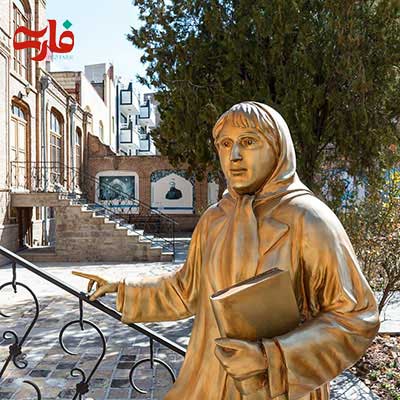
به ماه دی، گلستان گفت با برف
که ما را چند حیران میگذاری
بسی باریدهای بر گلشن و راغ
چه خواهد بود گر زین پس نباری
بسی گلبن، کفن پوشید از تو
بسی کردی بخوبان سوگواری
شکستی هر چه را، دیگر نپیوست
زدی هر زخم، گشت آن زخم کاری
هزاران غنچه نشکفته بردی
نوید برگ سبزی هم نیاری
چو گستردی بساط دشمنی را
هزاران دوست را کردی فراری
بگفت ای دوست، مهر از کینه بشناس
ز ما ناید بجز تیمارخواری
هزاران راز بود اندر دل خاک
چه کردستیم ما جز رازداری
بهر بی توشه ساز و برگ دادم
نکردم هیچگه ناسازگاری
بهار از دکهٔ من حله گیرد
شکوفه باشد از من یادگاری
من آموزم درختان کهن را
گهی سرسبزی و گه میوهداری
مرا هر سال، گردون میفرستد
به گلزار از پی آموزگاری
چمن یکسر نگارستان شد از من
چرا نقش بد از من مینگاری
به گل گفتم رموز دلفریبی
به بلبل، داستان دوستاری
ز من، گلهای نوروزی شب و روز
فرا گیرند درس کامکاری
چو من گنجور باغ و بوستانم
درین گنجینه داری هر چه داری
مرا با خود ودیعتهاست پنهان
ز دوران بدین بی اعتباری
هزاران گنج را گشتم نگهبان
بدین بی پائی و ناپایداری
دل و دامن نیالودم به پستی
بری بودم ز ننگ بد شعاری
سپیدم زان سبب کردن در بر
که باشد جامهٔ پرهیزکاری
قضا بس کار بشمرد و بمن داد
هزاران کار کردم گر شماری
برای خواب سرو و لاله و گل
چه شبها کردهام شب زندهداری
به خیری گفتم اندر وقت سرما
که میل خواب داری؟ گفت آری
به بلبل گفتم اندر لانه بنشین
که ایمن باشی از باز شکاری
چو نسرین اوفتاد از پای، گفتم
که باید صبر کرد و بردباری
شکستم لاله را ساغر، که دیگر
ننوشد می بوقت هوشیاری
فشردم نرگس مخمور را گوش
که تا بیرون کند از سر خماری
چو سوسن خسته شد گفتم چه خواهی
بگفت ار راست باید گفت، یاری
ز برف آماده گشت آب گوارا
گوارائی رسد زین ناگواری
بهار از سردی من یافت گرمی
منش دادم کلاه شهریاری
نه گندم داشت برزیگر، نه خرمن
نمیکردیم گر ما پردهداری
اگر یکسال گردد خشکسالی
زبونی باشد و بد روزگاری
از این پس، باغبان آید به گلشن
مرا بگذشت وقت آبیاری
روان آید به جسم، این مردگانرا
ز باران و ز باد نو بهاری
درختان، برگ و گل آرند یکسر
بدل بر فربهی گردد نزاری
بچهر سرخ گل، روشن کنی چشم
نه بیهوده است این چشم انتظاری
نثارم گل، ره آوردم بهار است
رهآورد مرا هرگز نیاری
عروس هستی از من یافت زیور
تو اکنون از منش کن خواستگاری
خبر ده بر خداوندان نعمت
که ما کردیم این خدمتگذاری
“To the moon of Dey (December/January) the garden spoke to the snow,
‘Why do you leave us so bewildered?
You have showered so much upon the flowers and meadows,
What will happen if you no longer shower?
You have dressed many a garden and meadow with white,
You have made many a good man grieve.
You have broken all that you broke, nothing more to break,
You inflicted every wound, what wound do you have left?
You took away unopened buds,
You bring no news of the green leaves.
You spread hostility everywhere,
You drove away many friends.
He said, ‘O friend, recognize love from animosity,
There is nothing but grief for us from them.
There were thousands of secrets in the heart of the earth,
Why did we do nothing but reveal secrets?
For your favor, I made groves and gave away leaves,
I have never been incompatible.
Spring takes its dress from me,
It will be a blossom from me as a remembrance.
I teach ancient trees,
At times, greenness and at times, bearing fruits.
Every year, the heavens send me,
As an instructor to the garden.
The meadow became an exhibition because of me,
Why do you depict bad things from me?
Make the high cypress trees sit in the grove,
Why do you depict things that belong to the hunter?
As narcissus fell from its height, I said,
You must be patient and endure.
I defeated the tulip, saying that it no longer
Drinks wine in a state of sobriety.
I held the intoxicated narcissus by the ear,
So it can make it out of its intoxicated state.
When the willow became exhausted, I asked,
What do you want? It replied, ‘Support.’
When the saffron found a suitable time, I said,
‘Would you like warmth?’ It replied, ‘Yes.’
I told the nightflower, ‘Rest in the nest,’
So that you’ll be safe from the hunter.
When the tuberose becomes ecstatic, I said,
You must endure and be patient.
I crushed the lilac with a wine glass, for it would no longer
Drink wine in a state of alertness.
I squeezed the tipsy narcissus’s ear,
So it can become sober from its intoxicated state.
If a snowy year becomes a dry year,
It will be despicable and of bad fortune.
From now on, the gardener will come to the garden,
He’ll have passed me and it will be time for irrigation.
The gardeners will come and put all the trees,
In turn, they will replace all the fresh ones.
The red blossom of the bud will brighten your eye,
This watchful eye is not in vain.
I brought a message for you, the time of spring has come,
Never withhold the support for me.
The tree will bring fruit and leaf,
They will come together with me.
The path of the garden will come alive,
From rain and wind, it will bring a new spring.
The trees will bring leaves and flowers together,
It will exchange something for nothing.
You turned the bright red flower into an ugly one,
Now you are not going to see it.
I brought a rose, I will now put it in your hair,
Do not treat this watchful eye in vain.
I brought this for you, now I made my offer,
You must accept my proposal.”
Read More:
Molana (Rumi) Poems in Farsi and English
Related Posts




